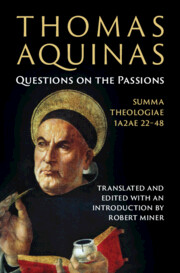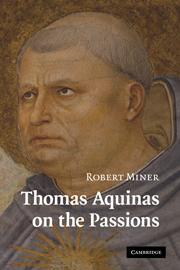36 results

Thomas Aquinas: Questions on the Passions
- Summa Theologiae 1a2ae 22-48
- Coming soon
-
- Expected online publication date:
- September 2024
- Print publication:
- 30 September 2024
-
- Book
- Export citation
Infused virtue as virtue simply: the centrality of the Augustinian definition in Summa theologiae I/2.55–67
-
- Journal:
- Scottish Journal of Theology / Volume 71 / Issue 4 / November 2018
- Published online by Cambridge University Press:
- 06 December 2018, pp. 411-424
- Print publication:
- November 2018
-
- Article
-
- You have access
- Open access
- HTML
- Export citation
1000 year ice-core records from Berkner Island, Antarctica
-
- Journal:
- Annals of Glaciology / Volume 35 / 2002
- Published online by Cambridge University Press:
- 14 September 2017, pp. 45-51
-
- Article
-
- You have access
- HTML
- Export citation
Detecting, Preventing, and Responding to “Fraudsters” in Internet Research: Ethics and Tradeoffs
-
- Journal:
- Journal of Law, Medicine & Ethics / Volume 43 / Issue 1 / Spring 2015
- Published online by Cambridge University Press:
- 01 January 2021, pp. 116-133
- Print publication:
- Spring 2015
-
- Article
- Export citation
Thomas Aquinas and Hans Urs von Balthasar: A Dialogue on Love and Charity
-
- Journal:
- New Blackfriars / Volume 95 / Issue 1059 / September 2014
- Published online by Cambridge University Press:
- 01 January 2024, pp. 504-524
- Print publication:
- September 2014
-
- Article
- Export citation
RESEARCH ARTICLE: Twenty Years of Forest Service National Environmental Policy Act Litigation
-
- Journal:
- Environmental Practice / Volume 12 / Issue 2 / June 2010
- Published online by Cambridge University Press:
- 11 May 2010, pp. 116-126
- Print publication:
- June 2010
-
- Article
- Export citation
Contributors
-
-
- Book:
- Acute Pain Management
- Published online:
- 26 October 2009
- Print publication:
- 27 April 2009, pp vii-xii
-
- Chapter
- Export citation

Thomas Aquinas on the Passions
- A Study of Summa Theologiae, 1a2ae 22–48
-
- Published online:
- 06 July 2009
- Print publication:
- 09 April 2009
A note on the texts
-
- Book:
- Thomas Aquinas on the Passions
- Published online:
- 06 July 2009
- Print publication:
- 09 April 2009, pp xi-xii
-
- Chapter
- Export citation
List of figures
-
- Book:
- Thomas Aquinas on the Passions
- Published online:
- 06 July 2009
- Print publication:
- 09 April 2009, pp vii-vii
-
- Chapter
- Export citation
Acknowledgments
-
- Book:
- Thomas Aquinas on the Passions
- Published online:
- 06 July 2009
- Print publication:
- 09 April 2009, pp ix-x
-
- Chapter
- Export citation
Introduction
-
- Book:
- Thomas Aquinas on the Passions
- Published online:
- 06 July 2009
- Print publication:
- 09 April 2009, pp 1-10
-
- Chapter
- Export citation
9 - Hope and despair
-
- Book:
- Thomas Aquinas on the Passions
- Published online:
- 06 July 2009
- Print publication:
- 09 April 2009, pp 215-230
-
- Chapter
- Export citation
Part 2 - PARTICULAR PASSIONS: THE CONCUPISCIBLE PASSIONS
-
- Book:
- Thomas Aquinas on the Passions
- Published online:
- 06 July 2009
- Print publication:
- 09 April 2009, pp 109-110
-
- Chapter
- Export citation
Frontmatter
-
- Book:
- Thomas Aquinas on the Passions
- Published online:
- 06 July 2009
- Print publication:
- 09 April 2009, pp i-iv
-
- Chapter
- Export citation
Bibliography
-
- Book:
- Thomas Aquinas on the Passions
- Published online:
- 06 July 2009
- Print publication:
- 09 April 2009, pp 300-307
-
- Chapter
- Export citation
10 - Fear
-
- Book:
- Thomas Aquinas on the Passions
- Published online:
- 06 July 2009
- Print publication:
- 09 April 2009, pp 231-251
-
- Chapter
- Export citation
5 - Love
-
- Book:
- Thomas Aquinas on the Passions
- Published online:
- 06 July 2009
- Print publication:
- 09 April 2009, pp 111-139
-
- Chapter
- Export citation
2 - The definition of passion
-
- Book:
- Thomas Aquinas on the Passions
- Published online:
- 06 July 2009
- Print publication:
- 09 April 2009, pp 29-57
-
- Chapter
- Export citation
6 - Hatred and concupiscence
-
- Book:
- Thomas Aquinas on the Passions
- Published online:
- 06 July 2009
- Print publication:
- 09 April 2009, pp 140-159
-
- Chapter
- Export citation



